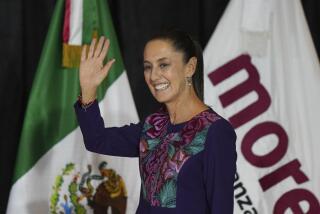Buchanan Wins Few Friends Abroad
- Share via
MOSCOW — Here’s the kind of help that Cold War doughboy Patrick J. Buchanan probably could do without just now:
“Comrade and brother-in-arms! . . . Your slogans are close and understandable to us,” said fellow presidential candidate Vladimir V. Zhirinovsky, Russia’s bellicose ultranationalist leader. “You say the [U.S.] Congress is ‘Israeli-occupied territory.’ We have the same situation here in Russia.”
After Buchanan publicly rejected Zhirinovsky’s embrace, the mercurial Russian sent him a letter accusing him of acting “like Clinton and other corrupt politicians.” The world is sounding off about Buchanan now--mostly with alarm. Sometimes with digs.
“An American nightmare,” read the headline in Yediot Aharonot, Israel’s largest-circulation daily. Writing from the U.S., reporter Tzadok Yehezkeli said: “The American arena and politics are full of people with racist ideas and positions against whites, blacks and Jews. But there is a central difference between leaders like [Nation of Islam director Louis] Farrakhan and [white supremacist] David Duke and Pat Buchanan: The latter is not a marginal phenomenon, nor is he lurking somewhere along the fringes of American politics.
“Quite the contrary. The most surprising thing is that this strange luggage that Buchanan has been carrying around for years has not prevented him from penetrating the legitimate mainstream of institutionalized American politics and its media.”
In the daily Davar Rishon, writer Eyal Naveh said Buchanan’s success in New Hampshire “is a crisis that raises questions as to the path this great democracy has taken, and raised concerned doubts as to the durability of the liberal-pluralistic ethos in America.”
‘Mexico Bashing’
In Mexico, there also is widespread concern as a result of Buchanan’s proposals to place a fence along the border and his denunciations of the North American Free Trade Agreement and the multibillion-dollar bailout package approved by President Clinton.
Not yet convinced Buchanan is electable, Mexicans nonetheless worry that his “Mexico bashing” will tarnish their country’s image in the U.S. and perhaps force Clinton to retrench during one of Mexico’s most critical hours.
“The unjust weight of this wild rhetoric will continue to fall on Mexico, which sadly could harden the decisions [of the Clinton Administration] as it tries to compete with the phantasms raised by Buchanan,” said political commentator Jorge Montano in a front-page editorial that appeared in one national daily.
Buchanan’s candidacy has had the unusual effect of uniting Mexico’s two rival political parties--on this subject, anyway.
Alejandro Sobarzo, head of international relations for the long-ruling Institutional Revolutionary Party [PRI], called Buchanan’s success so far “worrisome.”
“Buchanan is opposed not only to free trade but also to a [U.S.-Mexican] relationship based on cooperation and the spirit of goodwill,” he said.
Augustin Navarro, secretary for international relations for the increasingly powerful opposition National Action Party [PAN], expressed similar concerns. “What he’s really trying to do is Cubanize relations with Mexico; he almost wants to embargo us,” he said.
Anxiety in Canada
Canada, although not a primary target of Buchanan’s venom, is still a signatory to NAFTA. As a result, the candidate’s anti-treaty stance has stirred interest, and anxiety, in the country that remains America’s largest trading partner.
“Pat Buchanan is just the extreme manifestation of a U.S. habit of resorting to protectionism when the going gets tough,” the Halifax Chronicle-Herald said in an editorial. “ . . . If Americans want to put a bully like Pat Buchanan in their presidential pulpit, that is their affair. But neighbors like Canada should stand up to bullying that misrepresents their trading practices and uses them as scapegoats for American problems.”
Europeans joined in ridicule and tried to draw lessons for their own societies.
“Mussolini Made in the U.S.A.,” said the headline in the Bonn daily General Anzeiger.
With Germany in the midst of an economic downturn and unemployment at levels not seen for decades, some reformers have been singing the praises of American free-market policies, in contrast to Germany’s heavily taxed and regulated economy.
Now, however, some commentators suggest that Buchanan has highlighted the weakness with America’s strategy--”his fellow citizens have to work like peons and they still can’t make enough money to live,” wrote journalist Andrea Boehm of Berlin’s alternative daily, the Tageszeitung.
In England, the Economist put Buchanan on its cover with the headline, “Voice of America?”
“He taps deep into some dismayingly widespread and long-lived American opinions--isolationalism, protectionism, thinly veiled racism--and into some more reasonable and more widespread anxieties. That is what makes him so dangerous,” the magazine said.
French Criticism
In France, where class struggle is deeply rooted, the left-leaning Paris daily Liberation said Buchanan’s populist speeches “seduce part of the ‘worried middle class’ of white America, people for whom the American Dream has become a pipe dream, people who worry about losing their job and rebel against the growing divide between rich and poor.”
For his part, Buchanan is of course unrelenting.
Israeli television recently showed an Israeli reporter inching his way through the crowd to get near Buchanan. When he got close and introduced himself as a foreign correspondent, Buchanan said, “Foreign? Let’s get some Americans in here first.”
Times staff writers Mark Fineman in Mexico City, Craig Turner in Toronto, Mary Williams Walsh in Berlin, William D. Montalbano in London, Scott Kraft in Paris and John Balzar in Los Angeles contributed to this story.
More to Read
Get the L.A. Times Politics newsletter
Deeply reported insights into legislation, politics and policy from Sacramento, Washington and beyond. In your inbox three times per week.
You may occasionally receive promotional content from the Los Angeles Times.










